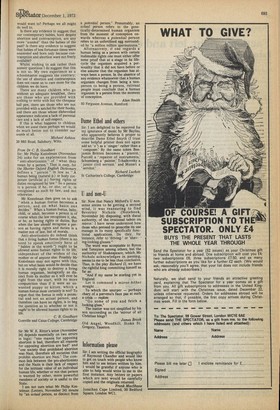From Dr C. B. Goodhart
Sir: Mr Philip Kestelman (November 24) asks for an explanation from ” anti-abortionists" of 'what they mean by a person." That is easy, for defines a " person " in law as " A human being (natural p.) or body cor porate (artificial p.) having rights or duties recognised by law." So a person is a person if he, or she, or it, is recognised as such by law, and not otherwise.
Mr Kestelman then goes on to ask "when a human foetus becomes a person, and on what basis one decides." When a human foetus, baby, child, or adult, becomes a person is of course when the law recognises it, she, or he, as having rights or duties. But when the law should recognise a person as having rights and duties is a matter not of law, but of morals.
Anti-abortionists do indeed think that a living human foetus (there is no need to speak emotively here of "babies in the womb ") ought to be allowed some human rights to its life, independent of the wishes of the mother or of anyone else. Possibly Mr Kestelman may not agree with this, but on what basis would he decide that it is morally right to destroy a living human organism, biologically as distinct from its mother as it will ever be right from the start, with no more compunction than if it were an unwanted puppy or kitten, which a human foetus most certainly is not? To argue that the foetus is only a potential and not an actual person, and therefore can have no rights, is to beg the question as to whether or not it ought to be allowed human rights to its life.
C. B. Goodhart Gonville and Caius College, Cambridge










































 Previous page
Previous page